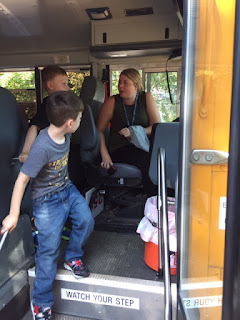As a counselor, I frequently meet with students when they lose a grandparent or a pet. These are common losses in the elementary world and can be difficult for students to focus on school when they are grieving this loss. I have resources for losses such as this - many in my library here at school and a few I stocked up on after I lost my dog last winter and had to explain death to my 5 and 2 year old through my own grief. While grief is a natural experience, there is nothing comfortable about it.
I have also walked with students as they grieve the loss of a parent. Such a major loss in a young life and each child grieves in a unique way. Whether the loss was sudden in an accident or over a period of time battling cancer, children who have lost a parent need extra support and love as they process through this. I have witnessed how the Willow community bands together when a child loses a parent and it is powerful and astonishing just how much love and support rallies when there is a need.
Then, on August 11th, I learned that our Willow community lost a sweet 5th grader, Lillian Fuglie. She was the poster child for kindness. She included others, stood up for what is right, and helped her classmates when she noticed they were sitting alone. I knew we would be having many conversations at school with her classmates and other students who were dealing with this loss during this school year. And in 11 years as a school counselor, I had never experienced the loss of a student. It was devastating and shocking. Since my natural response to stress is to research, I dove into texts and brochures to find any shred of insight into how to help my students and teachers grieve in a healthy way.
Thankfully, the American School Counseling Association (ASCA) offers specialist courses in a variety of things, and Grief and Loss was one of the topics. I was able to enroll in this and gain a list of resources that I have been able to share with our teachers and parents as needed. Some of it was common sense, but while in the midst of the crisis, there were pieces of advice that reminded me of just how differently children grieve.
While adults may sense the grief for a period of time and describe it as a "fog", children will "bounce" in and out of grief. This is concerning for adults who are not aware of this, because kids can look like they're giddy or happy - and then we worry "Why aren't they sad? Is this healthy?" But it is entirely normal. They cannot sit in grief for long periods of time. So you might see them silly and excited to see a friend, and then quiet and tearful the next. Helping children explain how they are feeling and supporting them in that grief will help them understand their emotions.
Another tip the experts share is to use terms like "death" and "die" with children rather than euphemisms like "passed away" or "sleeping". While adults use this language to soften the harsh reality, it is confusing for young children to understand what death really is and they may begin to assume that the person will "wake up" eventually and come back.
If your family has been affected by a loss and you would like more information, please don't hesitate to contact me. I have books for children to help them understand death and loss that may serve as a good "icebreaker" into the conversation. I also have texts for adults to help support children that you may find prepares you better for those discussions. In addition, the following links were offered via the ASCA training and I found very helpful.
Links to free resources:
Books/Activities to help explain death and grief to children:






